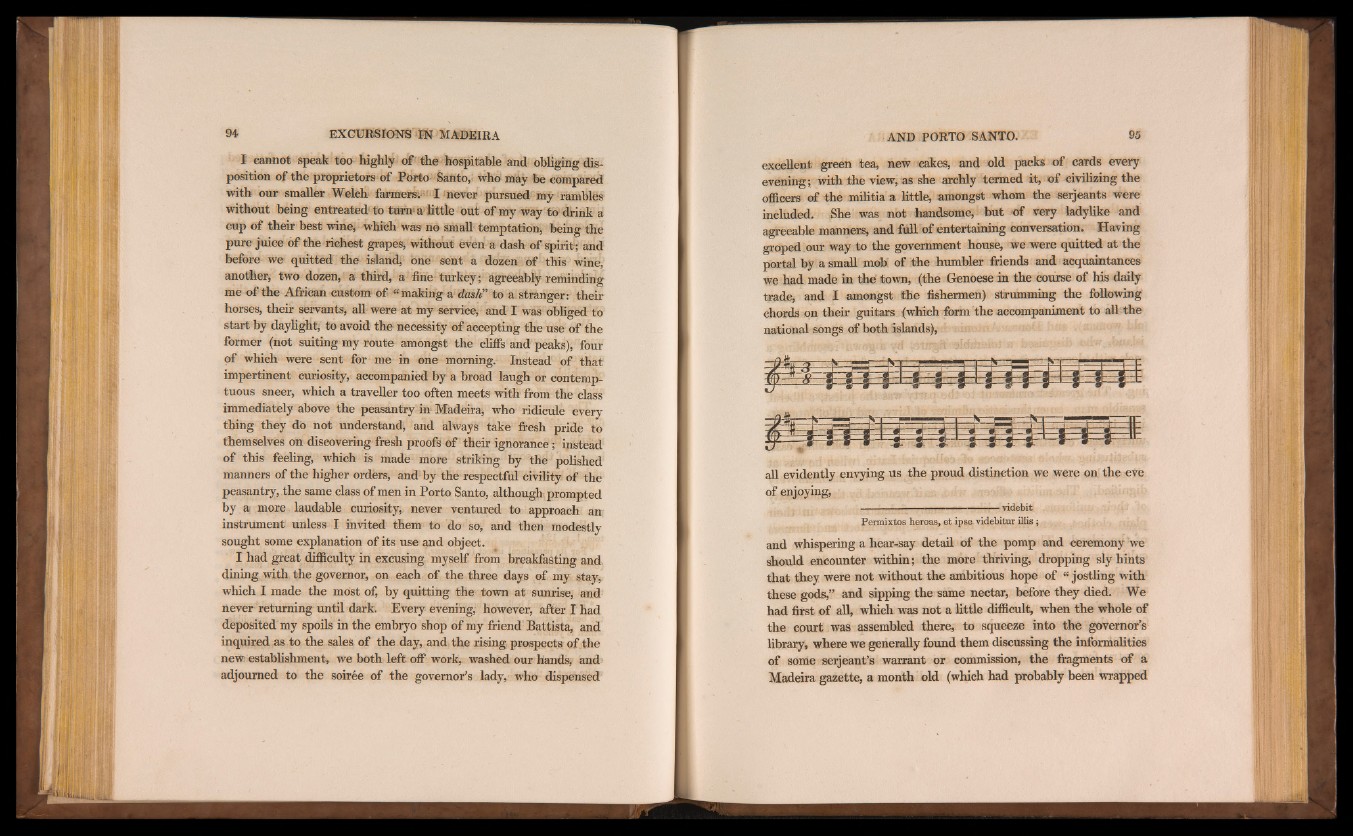
i cannot speak tea highly of' the hospitable and obliging disposition
of the proprietors of Porto Santo, who mà,y be compared
with our smaller Welch farmers. ' I never pursued my rambles
without being entreated'to turn1 a little out of my way to drink a
cup of their best wine, which was no small temptation, being the
pure juice of the richest grapes, without even a dash of spirit; and
before we quitted the island, one sent a dozen of this wine,
another, two dozen, a third, a fine turkey; agreeably reminding
me of the African custom of “ making a dash” to a stranger: their
horses, their servants, all were at my service, and I was obliged to
start by daylight, to avoid the necessity of accepting the use of the
former (not suiting my route amongst the cliffs and peaks), four
of which were sent for me in one morning. Instead of that
impertinent curiosity, accompanied by a broad laugh or contemptuous
sneer, which a traveller too often meets with from the class
immediately above the peasantry in* Madeira, who ridicule every
thing they do not understand, and always take fresh pride to
themselves on discovering fresh proofs of their ignorance ; instead
of this feeling, which is made more striking by the polished
manners of the higher orders, and by the respectful civility of the
peasantry, the same class of men in Porto Santo, although prompted
by a more laudable curiosity, never ventured to approach an
instrument unless I invited them to do so, and then modestly
sought some explanation of its use and object.
I had great difficulty in excusing myself from breakfasting and,
dining with the governor, on each of the three days of my stay,
which I made the most of, by quitting the town at sunrise, and
never returning until dark. Every evening, however, after I had
deposited my spoils in the embryo shop of my friend Battista, and
inquired as to the sales of the day, and the rising prospects of the
new establishment, we both left off work, washed our hands, and
adjourned to the soirée of the governor’s lady,* who dispensed
excellait green tea, new cakes, and old packs of caids every
evening ; with the view, as she archly termed it, of civilizing the
officers of the militia a little, amongst whom the serjeants were
included. She was not handsome, but of very ladylike and
agreeable manners, and full of entertaining conversation. Having
groped our way to the government house, we were quitted at the
portal by a small mob of the humbler friends and acquaintances
we had made in the town, (the Genoese in the course of his daily
trade, and I amongst the fishermen) strumming the following
chords on their guitars (which form the accompaniment to all the
national songs of both islands),
all evidently envying us the proud distinction we were on the eve
of enjoying,
videbit
Permixtos heroas, et ipse videbitur illis;
and whispering a hearsay detail of the pomp and ceremony we
should encounter within; the more thriving, dropping sly hints
that they were not without the ambitious hope of “ jostling with
these gods,” and sipping the same nectar, before they died. We
had first of all, which was not a little difficult, when the whole of
the court was assembled there, to squeeze into the governor’s
library, where we generally found them discussing the informalities
of some sejjeant’s warrant or commission, the fragments of a
Madeira gazette, a month old (which had probably been wrapped